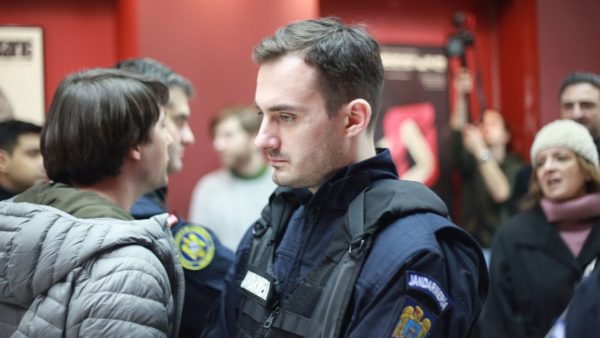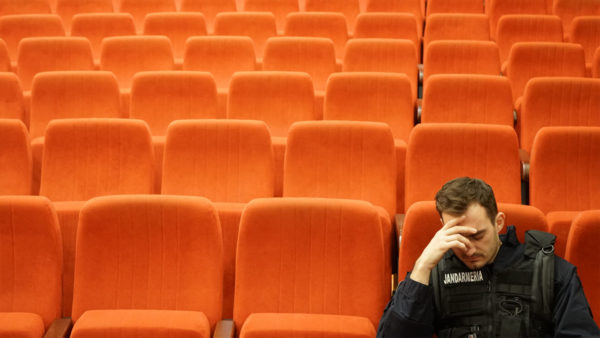
Director Eugen Jebeleanu’s Romanian film is equal parts frustrating and enthralling.
Set over the course of approximately one day, Poppy Field follows Cristi (Conrad Mericoffer), a member of the Gendarme (the national guard). In the morning he hosts his flight attendant boyfriend Hadi (Radouan Leflahi) for some sexy time, then goes to work diffusing a tense stand-off at a State movie theatre showing a lesbian film. As the debate about queer sexuality spills off the screen and into the aisles, Cristi’s closeted status, internalized homophobia and repressed rage contribute to a violent encounter marked by severe consequences.
Screenwriter Ioana Moraru dedicates the film’s first act to Cristi and Hadi’s tryst, slowly peeling back the layers of their relationship via a hot elevator make-out and pillow talk. The romantic bubble is pierced by a familial interruption in the form of Cristi’s sister Catalina (Cendana Trifan) who swings by to gawk at the man in her brother’s life. It’s only when Catalina is leaving, following an uncomfortable conversation that Moraru drops the hammer: the fuss is all because Cristi’s queerness is a relatively new thing (Catalina exclaims, “I wanted to see for myself this phase you’re going through…your gay phase”. It hits like a blow to the face).
Poppy Field then follows Cristi’s shift at work with a team of men who regularly use microaggressive language that is alternately misogynistic and homophobic. It’s the usual police tough guy talk, and director Jebeleanu regularly frames Mericoffer’s face either head-on or in profile and then leaves it there for long periods of time as Cristi listens impassively, his face and interior thoughts completely guarded.

The second act abandons isolated sexual intimacy to focus on the near-riot at the theatre as the Gendarme insert themselves between a group of conservative protestors and liberal-minded moviegoers. Despite the escalation in both stakes and scale, Jebeleanu continues to favour intimate hand-held camerawork that ensures the audience is kept right in the thick of the brewing conflict. It’s great, tense stuff, particularly the way Moraru’s script and Jebeleanu’s direction work in tandem to slowly ratchet up the likelihood of a violent outburst.
The transition from second to third act introduces an unanticipated form of violence, though: a physical encounter between Cristi and a gay man who threatens to expose their dating history. After dancing around a full-on culture clash, it’s a clever conceit to narrow the scope back down to Cristi, but it’s a big swing that unfortunately brings Poppy Field’s momentum to a grinding halt. While Cristi’s explanation of the inciting incident and the varying reactions of his team provides plenty of insight into homophobia among the Gendarme, stranding the protagonist in a theatre with sporadic conversation (however illuminating) ultimately becomes repetitive and even a little boring.

Still, Cristi is a fascinating and complex character and Mericoffer’s performance – a fantastic combination of dissociation, repressed rage and denial – is particularly notable. While the final act’s frequent innocuous conversations demand too much of audiences, the contrast between the opening’s romantic, isolationist Cristi and the finale’s volatile F-slur dropping Cristi is gripping.
If nothing else, Poppy Fields confirms that there are new and merit-worthy stories to be told about the closet and homophobia. 3/5
Poppy Field played Toronto’s Inside/Out Festival.